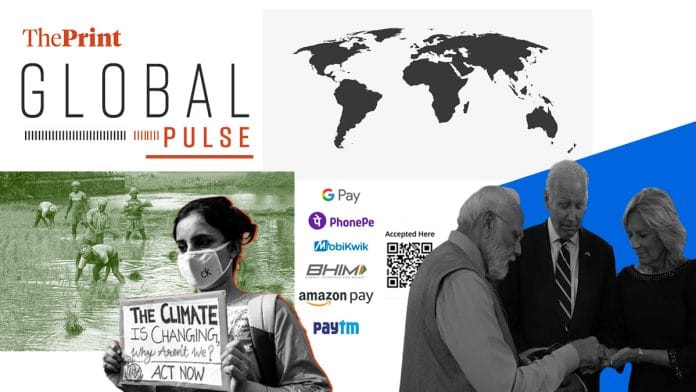New Delhi: The most expensive gift the Bidens received from a government or head of state in 2023 came from none other than Prime Minister Narendra Modi, according to the US State Department.
The Washington Post reported that Modi presented outgoing First Lady Jill Biden with a 7.5 carat lab-grown diamond worth no less than $20,000. There were a number of other gifts, too—a painting, a sandalwood box, a wall hanging. Some of these gifts were given to other members of the administration, chalking up to at least $30,000 worth in gifts.
The gifts were presented during Modi’s state visit in 2023—a visit that, the Post reports, was a “mix of showmanship and substantive agreements on technology, diplomacy and defense”.
In return, the White House gave Modi a “handmade, antique American book galley from the early 20th century” as an official gift, a vintage American camera and a signed copy of Robert Frost’s poems, among other items.
The diamond, however, was the most significant gift—and has now been “retained for official use in the East Wing” of the White House.
The Economist worries about how India will tackle climate change. Few places, it writes, “illustrate the challenges of adapting to climate change as clearly as the world’s most populous country.”
India isn’t yet a rich country, the piece says, but is already spending a fortune to adapt to climate change. And the challenges are vast: heat makes outdoor labour less productive—costing India the equivalent of 7 percent GDP annually—and most cities are running out of water.
Simple ideas can make a difference, The Economist advises, citing one example of how NGOs taught people in Mumbai’s slums to plant shade-giving trees on wasteland, which reduces heat stress and offers a cooler place to study.
“On incentives, India has great scope for improvement,” the piece continues. “It is the most water-stressed country in Asia, yet hardly anyone pays a sensible price for the stuff. As in many countries, farmers tap groundwater for free—often using subsidised electricity to power their pumps. Urban households are charged little for water, and many fail to pay their bills. The result is reckless waste, as farmers switch too slowly to drip irrigation and cities fail to capture rainfall efficiently.”
India already has lots of energetic green NGOs and innovative local fixes. But the real issue, as The Economist sees it, is that the government lacks urgency. “Neither the ruling Bharatiya Janata Party nor its main rivals talk much about the climate, and no one wants to pick a fight with farmers over water. At the state and local level, authority is often confused,” the piece says.
In another story on the climate, reported across Bengaluru, Mumbai and Wayanad, The Economist acknowledges that it will be tough for India to adapt to climate change: India is “poorer and hotter than the global average, and crams 1.4bn people onto a land mass slightly larger than Argentina”.
This reported story, too, prescribes political will and the “spread of know-how” as the only way forward for India. “India is so big and decentralised that it will be hard to keep track of how well it adapts to climate change. The rich, inevitably, will cope better, since they can afford air-conditioning and homes on higher ground. But they have to breathe the same air as everyone else, so the fact that air pollution in cities like Delhi has grown unbearable could spur greener policies.”
In its latest India Business Briefing newsletter, the Financial Times predicts India’s next digital payments boom—due any time, it says, now that WhatsApp has been given a free run by the National Payments Corporation of India (NPCI).
The NPCI has lifted its restriction on WhatsApp, which was offering its payment service to only 100 million people—a fraction of its users. Now, WhatsApp can roll out its payment services to all its users, estimated to be over 500 million.
“This move will widen the base of transacting accounts for the Unified Payments Interface—the technology that enables digital payment transactions in India—and increase its depth,” the FT writes.
The NPCI has also extended its deadline to comply with a market share cap that “restricts digital payment firms from accounting for more than 30 per cent of the volume of transactions processed through the UPI”. This will help PhonePe and Google Pay, both of which would have had to clip back their services had the extension not come through.
The government clearly wants to expand the market, cashing in on the success of UPI. But fraud is still a concern—rolling out “payments to all WhatsApp users leaves a large chunk of people who are financially or technologically inept vulnerable to scams,” the FT acknowledges.
“While opening up the market, it is imperative that the regulator imposes strict guidelines on WhatsApp to minimise fraud, educate users, and insure them against dubious transactions,” the newsletter cautions.






